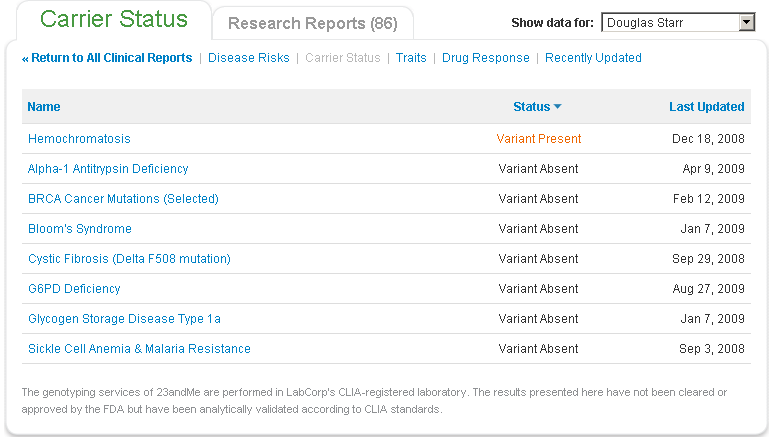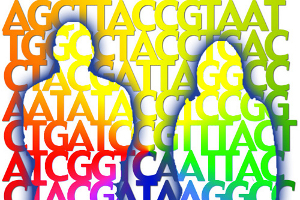For example, most cases of CF happen because of known differences in the CFTR gene. A genetic test can look for these differences and tell you if you and/or your spouse have any of them. If you both do, they can also give you a pretty good idea about the chances that your kids will get them too.
Of course, we don’t know all of the differences in the CFTR gene that can cause CF. And some differences only cause CF some of the time. And there are people with everyday, run-of-the-mill CFTR genes who get CF because of differences in different genes.
Still, as genetic tests go, these are pretty good. If a test comes up with a known CFTR difference that causes CF, then you have a pretty good idea of what your chances for developing CF are. If your spouse gets tested too, then your kids’ chances can be determined as well.
So how does 23andMe do? OK, I guess…
First off, they look at eight of these sorts of diseases under a category called Carrier Status. The diseases they look at are shown in this image:

For me, the first big result is that I am a carrier for a variant that can lead to hemochromatosis. This isn’t surprising since 1 in 8-12 people of Northern European descent in the U.S. are too, but it is definitely something to watch out for. It may be important for my wife to be checked too so we can make sure none of our kids got two copies. (Luckily hemochromatosis is easily treated by giving blood on a regular basis.)
Some of the other results are less illuminating. For example, I do not carry the CF difference they test for (delta F508). This is of course great news. Unfortunately, this variant only accounts for about half of the CF cases out there. Which means I could be a carrier for CF, just not a carrier of the most common variant that they happen to test for.
The same thing goes for most if not all of the other carrier status diseases (sickle cell anemia is an exception). Some like BRCA (breast cancer) are as poorly covered as CF while others like Bloom’s disease cover a larger percentage of cases.
23andMe is pretty upfront about the limitations of their testing once you dig a bit into the results. But still, if they’re going to look at 600,000 different parts of my DNA, you’d think they could add a few more to give me a stronger answer about whether or not I am a CF carrier.
37.33161018170129 -121.89019918441772
 What can genetic testing tell you?
What can genetic testing tell you?
